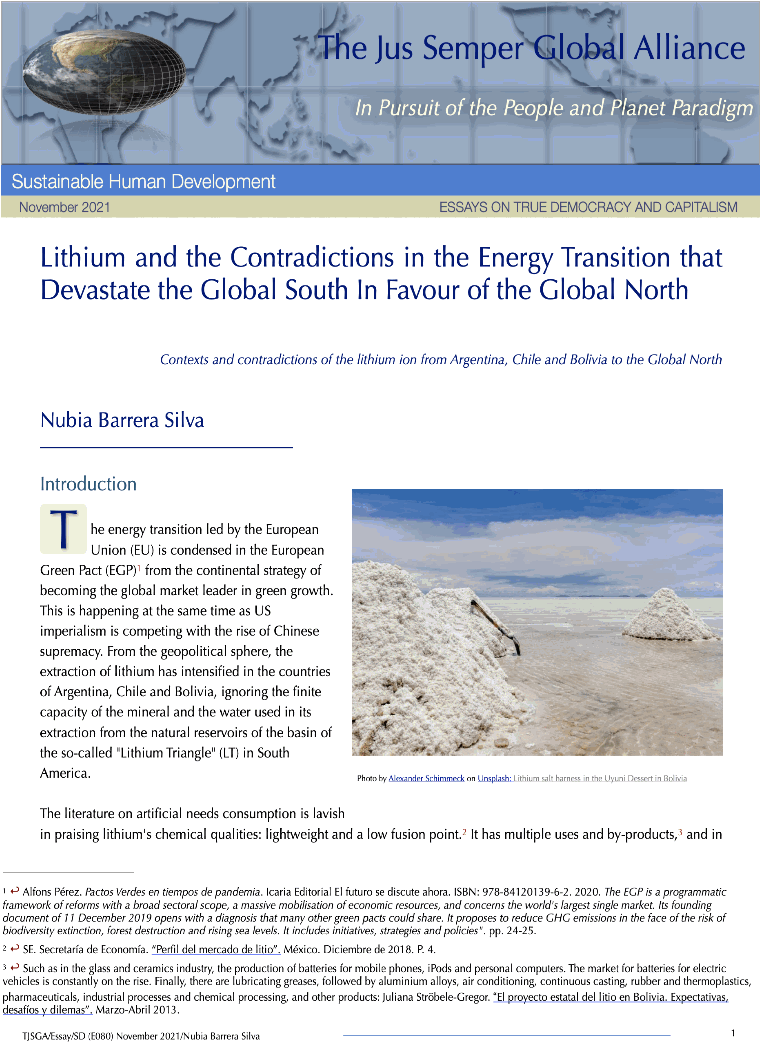Contexts and contradictions of the lithium ion from Argentina, Chile and Bolivia to the Global North
Nubia Barrera Silva The literature on artificial needs consumption is lavish in praising lithium's chemical qualities: lightweight and a low fusion point. It has multiple uses and by-products, and in less than five years, world demand will exceed the reserves in natural deposits. Lithium is being hoarded - mainly - by the electric car industry within the framework of the global energy economy or green capitalism. Lithium also represents the most efficient reservoir in the renewable generation of wind, solar, hydro and tidal electricity in the energy mix, under the International Energy Agency (IEA) guidelines, the World Bank (WB) and multilateral development agencies. We know that transnational corporations have a proven track record of deception, delays and denials, and a financial interest in continuing to pollute at any cost for the people or the planet. To this end, the World Bank creates the strategy of green capitalism within the framework of wealth concentration and the opening of markets for emission rights and other so-called green and clean offsets with environmental and sustainable rhetoric. Similarly, underneath the energy transition lie ambiguous expressions: sustainable capitalism, sustainable agriculture, sustainable use of energy and resources, among others. Thus, as capital reproduces itself, consumption intensifies, emissions increase and the global North's energy transition is proposed. Hence, the green economy hoax, an essential component of the policy of the European Green Pact (EGP) policy, emerges. Ulrich Brand reviews the two traps of green capitalism: In the first, it shifts the responsibility to humans as the main carbon emitters. In the second, euphemisms under the label of the energy mix prevail, with fossil energy in the first place, its false promises and arguments on emissions reduction. Just 100 corporations are responsible for 70 per cent of historical emissions. This includes the fossil fuel industry - a leading member - agribusiness, logging, aviation, technology and the financial bodies that support them. By 2050, if the global rulers and leaders of corporations and their financiers have not taken concrete actions towards implementing policies of economic degrowth, there will be no physical or digital army to stop the fury of migration towards the predatory countries of the North, dedicated to the plunder of wealth in more than two centuries of history in the Global South. Any system change is violent, as capital is sustained by dispossession of biophysical and material goods, unlimited profits, war and other forms of violence. In this war, nature's fury is already emerging as a new force with totally unprecedented events. And here we have the difference with already-known confrontations and disputes. However, we must recognise a fact inherent to human nature that could make a difference: its enormous capacity to remake itself with unusual reinventions. For a full read of this brief, click here or on the picture to download the pdf file. |

- © The Jus Semper Global Alliance
| Home |  | Resources |  | Economic Data |  | Lithium and the Contradictions in the Energy Transition that Devastate the Global South In Favour of the Global North |


